formerly eScholarship Editions


|
|
|
|
Your request for similar items found 20 book(s). | Modify Search | Displaying 1 - 20 of 20 book(s) | |
| 1. | 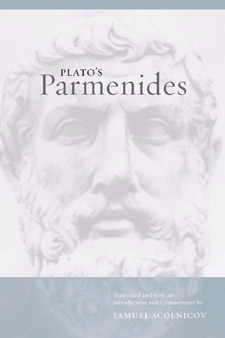 | Title: Plato's Parmenides Author: Plato Published: University of California Press, 2003 Subjects: Classics | Philosophy | Classical Philosophy Publisher's Description: Of all Plato's dialogues, the Parmenides is notoriously the most difficult to interpret. Scholars of all periods have disagreed about its aims and subject matter. The interpretations have ranged from reading the dialogue as an introduction to the whole of Platonic metaphysics to seeing it as a collection of sophisticated tricks, or even as an elaborate joke. This work presents an illuminating new translation of the dialogue together with an extensive introduction and running commentary, giving a unified explanation of the Parmenides and integrating it firmly within the context of Plato's metaphysics and methodology. Scolnicov shows that in the Parmenides Plato addresses the most serious challenge to his own philosophy: the monism of Parmenides and the Eleatics. In addition to providing a serious rebuttal to Parmenides, Plato here re-formulates his own theory of forms and participation, arguments that are central to the whole of Platonic thought, and provides these concepts with a rigorous logical and philosophical foundation. In Scolnicov's analysis, the Parmenides emerges as an extension of ideas from Plato's middle dialogues and as an opening to the later dialogues. Scolnicov's analysis is crisp and lucid, offering a persuasive approach to a complicated dialogue. This translation follows the Greek closely, and the commentary affords the Greekless reader a clear understanding of how Scolnicov's interpretation emerges from the text. This volume will provide a valuable introduction and framework for understanding a dialogue that continues to generate lively discussion today. [brief] Similar Items |
| 2. | 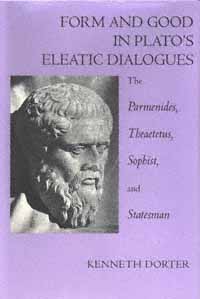 | Title: Form and good in Plato's Eleatic dialogues: the Parmenides, Theaetetus, Sophist, and Statesman Author: Dorter, Kenneth 1940- Published: University of California Press, 1994 Subjects: Classics | Philosophy | Classical Literature and Language Publisher's Description: In this innovative analysis, Plato's four eleatic dialogues are treated as a continuous argument. In Kenneth Dorter's view, Plato reconsiders the theory of forms propounded in his earlier dialogues and through an examination of the theory's limitations reaffirms and proves it essential. Contradicted are both those philosophers who argue that Plato espoused his theory of forms uncritically and those who argue that Plato in some sense rejected the theory and moved toward the categorical analysis developed byAristotle. Dorter's reexamination of Plato's insights implies an important new direction for modern philosophical inquiry. [brief] Similar Items |
| 3. |  | Title: Nuptial arithmetic: Marsilio Ficino's commentary on the fatal number in Book VIII of Plato's Republic Author: Allen, Michael J. B Published: University of California Press, 1994 Subjects: Classics | Philosophy | Medieval Studies | Renaissance History Publisher's Description: The latest of Michael Allen's distinguished studies of the Renaissance Neoplatonist, Marsilio Ficino (1433-1499), presents a difficult, fascinating text. Late in his career, Ficino wrote a commentary on the intractable passage in Book VIII of Plato's Republic that concerns the mysterious geometric or "fatal" number. He was thus the first modern interpreter of this famous passage, and Allen is the first in our era to translate and elucidate his remarkable commentary.Allen's critical translation of Ficino's analysis of the fatal number passage shows how it develops philosophical, psychological, numerological, astrological, and prophetic themes that had a particular resonance at the end of the fifteenth century. [brief] Similar Items |
| 4. | 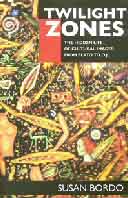 | Title: Twilight zones: the hidden life of cultural images from Plato to O.J Author: Bordo, Susan 1947- Published: University of California Press, 1997 Subjects: Sociology | Popular Culture | Politics | Social and Political Thought | Gender Studies | Media Studies Publisher's Description: Considering everything from Nike ads, emaciated models, and surgically altered breasts to the culture wars and the O.J. Simpson trial, Susan Bordo deciphers the hidden life of cultural images and the impact they have on our lives. She builds on the provocative themes introduced in her acclaimed work Unbearable Weight - which explores the social and political underpinnings of women's obsession with bodily image - to offer a singularly readable and perceptive interpretation of our image-saturated culture. As it becomes increasingly difficult to distinguish between appearance and reality, she argues, we need to rehabilitate the notion that not all versions of reality are equally trustworthy. Bordo writes with deep compassion, unnerving honesty, and bracing intelligence. Looking to the body and bodily practices as a concrete arena where cultural fantasies and anxieties are played out, she examines the mystique and the reality of empowerment through cosmetic surgery. Her brilliant discussion of sexual harassment reflects on the Clarence Thomas/Anita Hill controversy as well as the film Disclosure . She suggests that sexuality, although one of the mediums of harassment, is not its essence, and she calls for the recasting of harassers as bullies rather than sex fiends. Bordo also challenges the continuing marginalization of feminist thought, in particular the failure to read feminist work as cultural criticism. Finally, in a powerful and moving essay called "Missing Kitchens" - written in collaboration with her two sisters - Bordo explores notions of bodies, place, and space through a recreation of the topographies of her childhood. Throughout these essays, Bordo avoids dogma and easy caricature. Consistently, and on many levels, she demonstrates the profound relationship between our lives and our theories, our feelings and our thoughts. [brief] Similar Items |
| 5. | 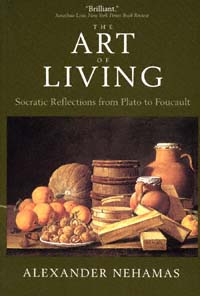 | Title: The art of living: Socratic reflections from Plato to Foucault Author: Nehamas, Alexander 1946- Published: University of California Press, 1998 Subjects: Classics | Classical Philosophy | Classical Literature and Language | Philosophy | Social and Political Thought | Literature Publisher's Description: For much of its history, philosophy was not merely a theoretical discipline but a way of life, an "art of living." This practical aspect of philosophy has been much less dominant in modernity than it was in ancient Greece and Rome, when philosophers of all stripes kept returning to Socrates as a model for living. The idea of philosophy as an art of living has survived in the works of such major modern authors as Montaigne, Nietzsche, and Foucault. Each of these writers has used philosophical discussion as a means of establishing what a person is and how a worthwhile life is to be lived. In this wide-ranging, brilliantly written account, Alexander Nehamas provides an incisive reevaluation of Socrates' place in the Western philosophical tradition and shows the importance of Socrates for Montaigne, Nietzsche, and Foucault.Why does each of these philosophers - each fundamentally concerned with his own originality - return to Socrates as a model? The answer lies in the irony that characterizes the Socrates we know from the Platonic dialogues. Socratic irony creates a mask that prevents a view of what lies behind. How Socrates led the life he did, what enabled or inspired him, is never made evident. No tenets are proposed. Socrates remains a silent and ambiguous character, forcing readers to come to their own conclusions about the art of life. This, Nehamas shows, is what allowed Montaigne, Nietzsche, and Foucault to return to Socrates as a model without thereby compelling them to imitate him.This highly readable, erudite study argues for the importance of the tradition within Western philosophy that is best described as "the art of living" and casts Montaigne, Nietzsche, and Foucault as the three major modern representatives of this tradition. Full of original ideas and challenging associations, this work will offer new ways of thinking about the philosophers Nehamas discusses and about the discipline of philosophy itself. [brief] Similar Items |
| 6. | 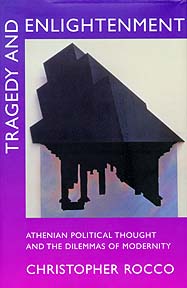 | Title: Tragedy and enlightenment: Athenian political thought, and the dilemmas of modernity Author: Rocco, Christopher 1958- Published: University of California Press, 1997 Subjects: Classics | Classical Philosophy | Classical History | Classical Literature and Language | Social and Political Thought | Social Theory Publisher's Description: Weaving together ancient Greek texts and postmodernist theory, Christopher Rocco addresses the debate between modernity and postmodernity that dominates contemporary theory. Interpreting Greek drama within a critical framework informed by contemporary theorists Foucault, Habermas, Horkheimer and Adorno, Tragedy and Enlightenment makes a sophisticated argument for the continuing relevance of the classical past, focusing on the subject of democracy.The starting point for Rocco's analysis is the impasse in contemporary political and cultural theory over the possibility and desirability of democracy in a postmodern world. After explaining the competing positions in the current debate, Rocco argues that ancient Greek tragedy and dialogue - specifically Sophocles' Oedipus , Plato's Republic and Gorgias , and Aeschylus' Oresteia - suggest alternate constructions for this and other postmodern problems.Rocco gives a detailed analysis of the contemporary divide over the theories of Jürgen Habermas and Michel Foucault and provides a provocative reading of Horkheimer and Adorno's Dialectic of Enlightenment. This original contribution to political and cultural discourse brings us to a new understanding of familiar texts and will alter the grounds of debate for students and scholars of the classical and the contemporary worlds. [brief] Similar Items |
| 7. | 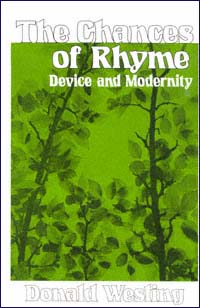 | Title: The chances of rhyme: device and modernity Author: Wesling, Donald Published: University of California Press, 1980 Subjects: Literature | English Literature Similar Items |
| 8. | 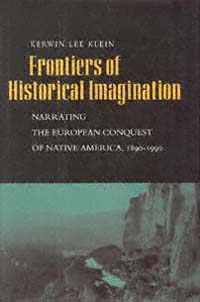 | Title: Frontiers of historical imagination: narrating the European conquest of native America, 1890-1990 Author: Klein, Kerwin Lee 1961- Published: University of California Press, 1997 Subjects: History | California and the West | American Studies | Anthropology | United States History | Intellectual History | Postcolonial Studies Publisher's Description: The American frontier, a potent symbol since Europeans first stepped ashore on North America, serves as the touchstone for Kerwin Klein's analysis of the narrating of history. Klein explores the traditions through which historians, philosophers, anthropologists, and literary critics have understood the story of America's origin and the way those understandings have shaped and been shaped by changing conceptions of history. The American West was once the frontier space where migrating Europe collided with Native America, where the historical civilizations of the Old World met the nonhistorical wilds of the New. It was not only the cultural combat zone where American democracy was forged but also the ragged edge of History itself, where historical and nonhistorical defied and defined each other. Klein maintains that the idea of a collision between people with and without history still dominates public memory. But the collision, he believes, resounds even more powerfully in the historical imagination, which creates conflicts between narration and knowledge and carries them into the language used to describe the American frontier. In Klein's words, "We remain obscurely entangled in philosophies of history we no longer profess, and the very idea of 'America' balances on history's shifting frontiers." [brief] Similar Items |
| 9. | 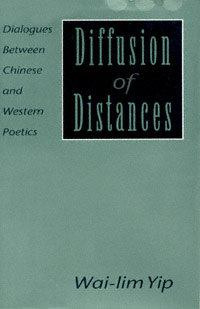 | Title: Diffusion of distances: dialogues between Chinese and Western poetics Author: Yip, Wai-lim Published: University of California Press, 1993 Subjects: Literature | Asian Studies | Philosophy | China | Asian Literature Publisher's Description: In this collection of passionately argued essays, the internationally acclaimed poet and critic Wai-lim Yip calls Western scholarship to account for its treacherous representation of non-Western literature. Yip moves from Plato to Hans-Georg Gadamer, from Chuang-tzu to Mao Tse-tung, from John Donne to Robert Creeley, as he attempts to create a double consciousness that includes the state of mind of the original author and the expressive potentials of the target language. He aims, first, to expose the types of distortions that have occurred in the process of translation from one language to another and, second, to propose guidelines that will prevent this kind of linguistic violence in the future. [brief] Similar Items |
| 10. | 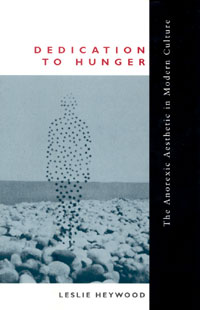 | Title: Dedication to hunger: the anorexic aesthetic in modern culture Author: Heywood, Leslie Published: University of California Press, 1996 Subjects: Gender Studies | Literary Theory and Criticism | Women's Studies | Literature Publisher's Description: Writing as a competitive athlete, an academic, and a woman, Leslie Heywood merges personal history and scholarship to expose the "anorexic logic" that underlies Western high culture. She maneuvers deftly across the terrain of modern literature, illustrating how this logic - the privileging of mind over body, of hard over soft, of masculine over feminine - is at the heart of the modernist style. Her argument ranges from Plato to women's bodybuilding, from Franz Kafka to Nike ads.In penetrating examinations of Kafka, Pound, Eliot, William Carlos Williams, and Conrad, Heywood demonstrates how the anorexic aesthetic is embodied in high modernism. In a compelling chapter on Jean Rhys, Heywood portrays an author who struggles to develop a clean, spare, "anorexic" style in the midst of a shatteringly messy emotional life. As Heywood points out, students are trained in the aesthetic of high modernism, and academics are pressured into its straitjacket. The resulting complications are reflected in structures as diverse as gender identity formation, sexual harassment, and eating disorders.Direct, engaging, and intensely informed by the author's personal involvement with her subject, Dedication to Hunger offers a powerful challenge to cultural assumptions about language, gender, subjectivity, and identity. [brief] Similar Items |
| 11. | 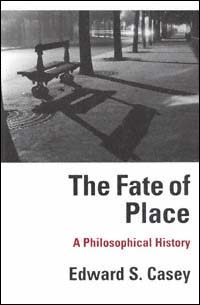 | Title: The fate of place: a philosophical history Author: Casey, Edward S 1939- Published: University of California Press, 1997 Subjects: Philosophy | Classical Philosophy | Architecture | Intellectual History | Geography Publisher's Description: In this imaginative and comprehensive study, Edward Casey, one of the most incisive interpreters of the Continental philosophical tradition, offers a philosophical history of the evolving conceptualizations of place and space in Western thought. Not merely a presentation of the ideas of other philosophers, The Fate of Place is acutely sensitive to silences, absences, and missed opportunities in the complex history of philosophical approaches to space and place. A central theme is the increasing neglect of place in favor of space from the seventh century A.D. onward, amounting to the virtual exclusion of place by the end of the eighteenth century.Casey begins with mythological and religious creation stories and the theories of Plato and Aristotle and then explores the heritage of Neoplatonic, medieval, and Renaissance speculations about space. He presents an impressive history of the birth of modern spatial conceptions in the writings of Newton, Descartes, Leibniz, and Kant and delineates the evolution of twentieth-century phenomenological approaches in the work of Husserl, Merleau-Ponty, Bachelard, and Heidegger. In the book's final section, Casey explores the postmodern theories of Foucault, Derrida, Tschumi, Deleuze and Guattari, and Irigaray. [brief] Similar Items |
| 12. | 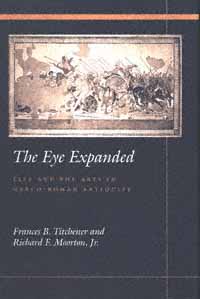 | Title: The eye expanded: life and the arts in Greco-Roman antiquity Author: Titchener, Frances B 1954- Published: University of California Press, 1999 Subjects: Classics | Classical History | Classical Literature and Language | Art and Architecture | Classical Politics | Classical Religions | Ancient History Publisher's Description: Plato and Aristotle both believed that the arts were mimetic creations of the human mind that had the power to influence society. In this they were representative of a widespread consensus in ancient culture. Cultural and political impulses informed the fine arts, and these in turn shaped - and were often intended to shape - the living world. The contributors to this volume, all of whom have been encouraged and inspired by the work of Peter Green, document the interaction between life and the arts that has made art more lively and life more artful in sixteen essays with subjects ranging from antiquity to modern times.With topics ranging from Antigone to D. H. Lawrence and Norman Douglas, and from Bactrian coins to Livy's characterization of women, the scope, the zest, and the scholarship of these essays will illuminate new avenues in our understanding of the relationship between classics and culture, and in our appreciation of both the artistic products that have come down to us and the varieties of life from which they spring. [brief] Similar Items |
| 13. | 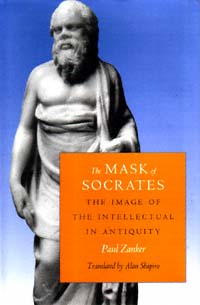 | Title: The mask of Socrates: the image of the intellectual in antiquity Author: Zanker, Paul Published: University of California Press, 1996 Subjects: Classics | Art History | Art and Architecture | Ancient History Publisher's Description: This richly illustrated work provides a new and deeper perspective on the interaction of visual representation and classical culture from the fifth century B.C. to the fourth century A.D. Drawing on a variety of source materials such as Graeco-Roman literature, historiography, and philosophy, in addition to artistic renderings, Paul Zanker forges the first comprehensive history of the visual representation of Greek and Roman intellectuals. He takes the reader from the earliest visual images of Socrates and Plato to the figures of Christ, the Apostles, and contemporaneous pagan and civic dignitaries.Through his interpretations of postures, gestures, facial expressions, and stylistic changes of particular set pieces, we come to know these great poets and philosophers through all of their various personas - the prophetic wise man, the virtuous democratic citizen, or the self-absorbed bon vivant. Zanker's analysis of how the iconography of influential thinkers and writers changed demonstrates the rise and fall of trends and the movement of schools of thought and belief, each successively embodying the most valued characteristics of the period and culture. [brief] Similar Items |
| 14. | 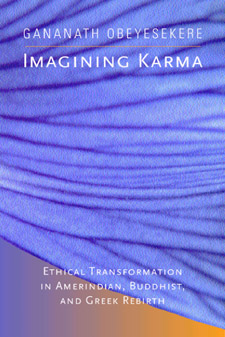 | Title: Imagining karma: ethical transformation in Amerindian, Buddhist, and Greek rebirth Author: Obeyesekere, Gananath Published: University of California Press, 2002 Subjects: Religion | Anthropology | Buddhism | Classics | Indigenous Religions | Asian Studies Publisher's Description: With Imagining Karma, Gananath Obeyesekere embarks on the very first comparison of rebirth concepts across a wide range of cultures. Exploring in rich detail the beliefs of small-scale societies of West Africa, Melanesia, traditional Siberia, Canada, and the northwest coast of North America, Obeyesekere compares their ideas with those of the ancient and modern Indic civilizations and with the Greek rebirth theories of Pythagoras, Empedocles, Pindar, and Plato. His groundbreaking and authoritative discussion decenters the popular notion that India was the origin and locus of ideas of rebirth. As Obeyesekere compares responses to the most fundamental questions of human existence, he challenges readers to reexamine accepted ideas about death, cosmology, morality, and eschatology. Obeyesekere's comprehensive inquiry shows that diverse societies have come through independent invention or borrowing to believe in reincarnation as an integral part of their larger cosmological systems. The author brings together into a coherent methodological framework the thought of such diverse thinkers as Weber, Wittgenstein, and Nietzsche. In a contemporary intellectual context that celebrates difference and cultural relativism, this book makes a case for disciplined comparison, a humane view of human nature, and a theoretical understanding of "family resemblances" and differences across great cultural divides. [brief] Similar Items |
| 15. | 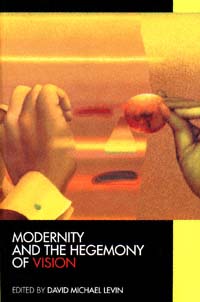 | Title: Modernity and the hegemony of vision Author: Levin, David Michael 1939- Published: University of California Press, 1993 Subjects: Philosophy | Literature | Ethics Publisher's Description: This collection of original essays by preeminent interpreters of continental philosophy explores the question of whether Western thought and culture have been dominated by a vision-centered paradigm of knowledge, ethics, and power. It focuses on the character of vision in modern philosophy and on arguments for and against the view that contemporary life and thought are distinctively "ocularcentric." The authors examine these ideas in the context of the history of philosophy and consider the character of visual discourse in the writings of Plato, Descartes, Hegel, Nietzsche, Husserl, Heidegger, Benjamin, Sartre, Merleau-Ponty, Levinas, Derrida, Foucault, Gadamer, Wittgenstein, and Habermas. With essays on television, the visual arts, and feminism, the book will interest readers in cultural studies, gender studies, and art history as well as philosophers. [brief] Similar Items |
| 16. | 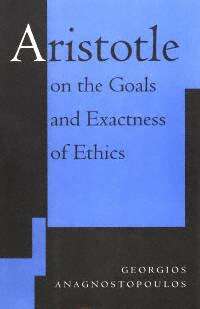 | Title: Aristotle on the goals and exactness of ethics Author: Anagnostopoulos, Georgios Published: University of California Press, 1994 Subjects: Philosophy | Classical Philosophy Publisher's Description: Philosophers as diverse as Socrates, Plato, Spinoza, and Rawls have sometimes argued that ethics can be an exact discipline whose propositions can match the exactness we associate with mathematics. Yet for Aristotle, knowledge of ethical matters is essentially inexact, and his perceptive criticisms of the Socratic-Platonic ideal of ethical knowledge and its metaphysical presuppositions remain of enduring interest to contemporary moral theorists.Georgios Anagnostopoulos offers the most systematic and comprehensive critical examination to date of Aristotle's views on the exactness of ethics. Combining rigorous philosophical argument and close analysis of the philosopher's treatises on human conduct, he gives form to Aristotle's belief that knowledge of matters of conduct, not unlike knowledge of most natural phenomena, can never be free of certain kinds of inexactness. He concludes that according to Aristotle, ethics constitutes a mode of knowledge that is neither totally nondemonstrative on account of its inexactness nor free of the important epistemological difficulties common to all nonmathematical disciplines. [brief] Similar Items |
| 17. | 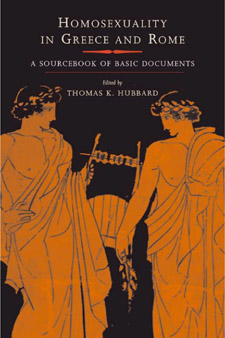 | Title: Homosexuality in Greece and Rome: a sourcebook of basic documents Author: Hubbard, Thomas K Published: University of California Press, 2003 Subjects: Gender Studies | Classics | GayLesbian and Bisexual Studies Publisher's Description: The most important primary texts on homosexuality in ancient Greece and Rome are translated into modern, explicit English and collected together for the first time in this comprehensive sourcebook. Covering an extensive period - from the earliest Greek texts in the late seventh century b.c.e. to Greco-Roman texts of the third and fourth centuries c.e. - the volume includes well-known writings by Plato, Sappho, Aeschines, Catullus, and Juvenal, as well as less well known but highly relevant and intriguing texts such as graffiti, comic fragments, magical papyri, medical treatises, and selected artistic evidence. These fluently translated texts, together with Thomas K. Hubbard's valuable introductions, clearly show that there was in fact no more consensus about homosexuality in ancient Greece and Rome than there is today. The material is organized by period and by genre, allowing readers to consider chronological developments in both Greece and Rome. Individual texts each are presented with a short introduction contextualizing them by date and, where necessary, discussing their place within a larger work. Chapter introductions discuss questions of genre and the ideological significance of the texts, while Hubbard's general introduction to the volume addresses issues such as sexual orientation in antiquity, moral judgments, class and ideology, and lesbianism. With its broad, unexpurgated, and thoroughly informed presentation, this unique anthology gives an essential perspective on homosexuality in classical antiquity. [brief] Similar Items |
| 18. | 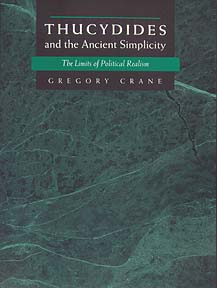 | Title: Thucydides and the ancient simplicity: the limits of political realism Author: Crane, Gregory 1957- Published: University of California Press, 1998 Subjects: Classics | Politics | Political Theory | History | Intellectual History Publisher's Description: Thucydides' History of the Peloponnesian War is the earliest surviving realist text in the European tradition. As an account of the Peloponnesian War, it is famous both as an analysis of power politics and as a classic of political realism. From the opening speeches, Thucydides' Athenians emerge as a new and frightening source of power, motivated by self-interest and oblivious to the rules and shared values under which the Greeks had operated for centuries. Gregory Crane demonstrates how Thucydides' history brilliantly analyzes both the power and the dramatic weaknesses of realist thought. The tragedy of Thucydides' history emerges from the ultimate failure of the Athenian project. The new morality of the imperialists proved as conflicted as the old; history shows that their values were unstable and self-destructive. Thucydides' history ends with the recounting of an intellectual stalemate that, a century later, motivated Plato's greatest work. Thucydides and the Ancient Simplicity includes a thought-provoking discussion questioning currently held ideas of political realism and its limits. Crane's sophisticated claim for the continuing usefulness of the political examples of the classical past will appeal to anyone interested in the conflict between the exercise of political power and the preservation of human freedom and dignity. [brief] Similar Items |
| 19. | 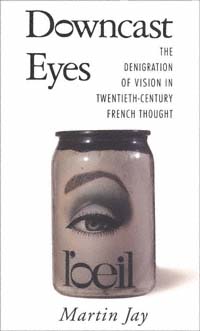 | Title: Downcast eyes: the denigration of vision in twentieth-century French thought Author: Jay, Martin 1944- Published: University of California Press, 1993 Subjects: Philosophy | Intellectual History | French Studies | Literary Theory and Criticism | Art Theory Publisher's Description: Long considered "the noblest of the senses," vision has increasingly come under critical scrutiny by a wide range of thinkers who question its dominance in Western culture. These critics of vision, especially prominent in twentieth-century France, have challenged its allegedly superior capacity to provide access to the world. They have also criticized its supposed complicity with political and social oppression through the promulgation of spectacle and surveillance.Martin Jay turns to this discourse surrounding vision and explores its often contradictory implications in the work of such influential figures as Jean-Paul Sartre, Maurice Merleau-Ponty, Michel Foucault, Jacques Lacan, Louis Althusser, Guy Debord, Luce Irigaray, Emmanuel Levinas, and Jacques Derrida. Jay begins with a discussion of the theory of vision from Plato to Descartes, then considers its role in the French Enlightenment before turning to its status in the culture of modernity. From consideration of French Impressionism to analysis of Georges Bataille and the Surrealists, Roland Barthes's writings on photography, and the film theory of Christian Metz, Jay provides lucid and fair-minded accounts of thinkers and ideas widely known for their difficulty.His book examines the myriad links between the interrogation of vision and the pervasive antihumanist, antimodernist, and counter-enlightenment tenor of much recent French thought. Refusing, however, to defend the dominant visual order, he calls instead for a plurality of "scopic regimes." Certain to generate controversy and discussion throughout the humanities and social sciences, Downcast Eyes will consolidate Jay's reputation as one of today's premier cultural and intellectual historians. [brief] Similar Items |
| 20. |  | Title: Who survives cancer? Author: Greenwald, Howard P Published: University of California Press, 1992 Subjects: Sociology | Environmental Studies | Medicine Publisher's Description: FACT OR FICTION? *A white male earning over $35,000 a year has a better chance of surviving most types of cancer than an unemployed African-American male.*Psychological factors predispose people to contracting cancer and improved emotional health promotes recovery.*Early detection is useless in curing cancer.*Experimental, not conventional, treatments offer the most benefits and longer survival rates to cancer patients.*A scientific breakthrough of practical and immediate significance in cancer treatment is imminent.*Cancer prevention is ineffective in many areas and campaigns will probably never achieve a reduction of cancer mortality approaching 50 percent.*Health Maintenance Organizations (HMOs) increase survival chances for most cancer patients.Howard Greenwald takes an incisive new look at how class, race, sex, psychological state, type of health care and available treatments affect one's chance of surviving cancer. Drawing on an original ten-year survival study of cancer patients, he synthesizes medical, epidemiological, and psychosocial research in a uniquely interdisciplinary and eye-opening approach to the question of who survives cancer and why.Scientists, health care professionals, philanthropists, government agencies, and ordinary people all agree that significant resources must be allocated to fight this dreaded disease. But what is the most effective way to do it? Greenwald argues that our priorities have been misplaced and calls for a fundamental rethinking of the way the American medical establishment deals with the disease. He asserts that the emphasis on prevention and experimental therapy has only limited value, whereas the availability of conventional medical care is very important in influencing cancer survival. Class and race become strikingly significant in predicting who has access to health care and can therefore obtain medical treatment in a timely, effective manner. Greenwald counters the popular notion that personality and psychological factors strongly affect survival, and he underscores the importance of early detection. His research shows that Health Maintenance Organizations, while sometimes prone to delays, offer low-income patients a better chance of ultimate survival. Greenwald pleads for immediate attention to the inadequacies and inequalities in our health care delivery system that deter patients from seeking regular medical care.Instead of focusing on research and the hope for a breakthrough cure, Greenwald urges renewed emphasis on ensuring available health care to all Americans. In its challenge to the thrust of much biomedical research and its critique of contemporary American health care, as well as in its fresh and often counterintuitive look at cancer survival, Who Survives Cancer? is invaluable for policymakers, health care professionals, and anyone who has survived or been touched by cancer. [brief] Similar Items |